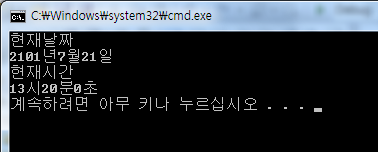출처 : http://bestheroz.blog.me/109841952
시간과 날짜와 관련된 라이브러리 함수
|
구분 |
함수 원형과 인자 |
함수 설명 |
|
시간 계산 |
time_t time(time_t *timeptr); |
1970년 1월 1일 자정부터 경과된 현재 시간을 초단위로 계산 |
|
시간을 문자열로 변환 |
char *asctime(strcut tm *time); |
구조체 tm형식의 시간을 문자열로 변환 |
|
char *ctime(time_t *time); |
함수 time()로부터 계산된 현재 시간을 문자열로 변환 | |
|
시간을 구조체로 변환 |
struct tm *localtime(time_t *time); |
지역 시간(local time)을 구조체 tm의 형식으로 가져오는 함수 |
|
struct tm *gmtime(time_t *time); |
Greenwich Meam Time(GMT)을 구조체 tm 형식으로 가져옴 | |
|
시간 차이 계산 |
clock_t clock(void); |
clock tick으로 경과된 시간 |
|
double difftime(time_t time2, time_t time1); |
두 시간의 차이를 초단위로 계산 | |
|
시간 지연 |
void Sleep(unsigned millisecond); |
인자가 지정하는 만큼의 1/1000초 단위의 시간을 지연 |
|
void delay(unsigned millisecond); |
예제
|
#include<stdio.h> #include<time.h>
int main(void) { time_t now; time(&now); printf("현재날짜와시간: %s", asctime(localtime(&now))); printf("현재날짜와시간: %s", ctime(&now));
return 0; } |
strcut tm은 <time.h>에 다음과 같이 정의되어 있다.
|
struct tm { int tm_sec; /* 초(seconds) - [0,59] */ int tm_min; /* 분(minutes) - [0,59] */ int tm_hour; /* 시간(hour) - [0,23] */ int tm_mday; /* 날짜(day) - [1,31] */ int tm_mon; /* 월(month) - [0,11] */ int tm_year; /* 1900년이후의연도수*/ int tm_wday; /* dydlf(second) - [0,6] */ int tm_yday; /* 연중날짜(day) - [0,365] */ int tm_isdst; /* 일광절약시간 - [0, 59] */ }; |
예제
|
#include<stdio.h> #include<time.h> int main(void) { time_t curr; struct tm *d; curr=time(NULL); d=localtime(&curr); printf("현재날짜\n"); printf("%d년%d월%d일\n", d->tm_year+1900, d->tm_mon+1, d->tm_mday); printf("현재시간\n"); printf("%d시%d분%d초\n", d->tm_hour, d->tm_min, d->tm_sec); return 0; } |
time과 clock의 차이
|
구분 |
함수 time |
함수 clock |
|
원형 |
time_t time(time_t *timer); |
clock_t clock(void); |
|
기능 |
절대시간 또는 달력시간(calendar time)을 계산 |
프로세서 시간을 계산 |
|
반환 값 |
1970년 1월 1일 자정 이후 현재까지 경과된 시간을 초(second)로 반환 |
프로세서 시간을 반환 |
예제 - 함수 time 사용
|
#include<stdio.h> #include<time.h>
int main(void) { time_t start, end; long i=0; double pst;
start=time(NULL);
while(i<30000000) { i++; }
end=time(NULL); pst=difftime(end, start); printf("time: %f\n", pst);
return 0; } /**초단위의시간을계산하는함수time()의결과는0초**/ |
예제 - 함수 clock 사용
|
#include<stdio.h> #include<time.h>
int main(void) { time_t start, end; long i=0; double pst;
start=clock();
while(i<30000000) { i++; }
end=clock(); pst=(double)(end-start)/CLK_TCK; printf("time: %f\n", pst);
return 0; } |
시간을 지연시키는 함수 Sleep 예제
|
#include<stdio.h> #include<time.h> #include<windows.h> //Sleep()
int main(void) { clock_t start, end; double pst;
start = clock(); printf("start!\n"); Sleep(3500); end = clock(); printf("end\n"); pst = (double)(end-start)/CLK_TCK; printf("경과시간: %f\n", pst);
return 0; } |
시간을 처리하는 함수와는 다른 개념의 함수이지만 유용하게 사용할 수 있는 함수로 kbhit가 있다. 이 함수의 원형은 다음과 같이 함수의 인자가 없으며, 키보드 상의 어떤 키를 누르면 0이 아닌 값을, 누르지 않은 상태라면 0값을 반환하는 함수다. 함수 kbhit는 <conio.h>를 필요로 한다.
|
kbhit |
함수원형 |
int kbhit(void); |
|
반환 값 |
입력된 키가 있으면 0이 아닌 값을, 입력된 키가 없으면 0을 반환 |
프로그램 실행중에 아무키나 누르기 전까지만 프로그램을 계속 반복시키고자 한다면 반복문 while과 함께 다음과 같이 사용할 수 있다.
|
while(!kbhit()) { //반복할프로그램 } |
예제 - 현재 시간을 연속적으로 출력(kbhit, localtime)
|
#include<stdio.h> #include<time.h> #include<stdlib.h> #include<conio.h> int main(void) { time_t now; struct tm *d;
while(!kbhit()) { system("cls"); now=time(NULL); d=localtime(&now); printf("현재날짜와시간: %s\n", asctime(d)); } return 0; } |
날짜 수와 요일 계산
기준일(1년 1월 1일)로부터 특정일 사이의 날짜 수의 계싼 함수 total_days
|
long total_days(int year, int month, int day) { int months[]={31, 28, 31, 30, 31, 30, 31, 31, 30, 31, 30, 31}; int i; long total=0L;
total=(year-1)*365L+(year-1)/4-(year-1)/100+(year-1)/400; if(!(year%4) && year%100 || !(ytear%400)) months[1]++; for(i=0;i<month-1;i++) total += months[i]; total += day;
return total; } |
특정일의 요일 계산
|
#include<stdio.h>
long total_days(int year, int month, int day);
int main(void) { int year, month, day; char *week_day[] = {"일", "월", "화", "수", "목", "금", "토"}; long total;
printf("특정일의요일구하는프로그램\n\n"); printf("입력될숫자는space bar로분리하고\n"); printf("Enter 키를누릅니다.\n"); printf("예로2005 5 1 Enter\n"); printf("년월일입력: "); scanf("%d %d %d", &year, &month, &day);
total=total_days(year, month, day);
printf("%s 요일입니다.\n", week_day[total%7]);
return 0; }
long total_days(int year, int month, int day) { int months[]={31, 28, 31, 30, 31, 30, 31, 31, 30, 31, 30, 31}; int i; long total=0L;
total=(year-1)*365L+(year-1)/4-(year-1)/100+(year-1)/400; if(!(year%4) && year%100 || !(year%400)) months[1]++; for(i=0;i<month-1;i++) total += months[i]; total += day;
return total; } |
특정일 사이의 날짜 수를 계산
|
#include<stdio.h>
long total_days(int year, int month, int day);
int main(void) { long total;
total=total_days(2010, 7, 21) - total_days(1987, 4, 16);
printf("두날짜사이의날짜수: %ld\n", total);
return 0; }
long total_days(int year, int month, int day) { int months[]={31, 28, 31, 30, 31, 30, 31, 31, 30, 31, 30, 31}; int i; long total=0L;
total=(year-1)*365L+(year-1)/4-(year-1)/100+(year-1)/400; if(!(year%4) && year%100 || !(year%400)) months[1]++; for(i=0;i<month-1;i++) total += months[i]; total += day;
return total; } |
'Coding Tip > Library' 카테고리의 다른 글
| 리눅스 동적 라이브러리 생성 팁 (0) | 2013.09.25 |
|---|---|
| libxml 간단 사용법 정리 (2) | 2012.08.01 |
| Libxml2를 설치해서 사용해 보아요-2 (0) | 2011.06.21 |
| Libxml2를 설치해서 사용해 보아요 (0) | 2011.02.07 |







